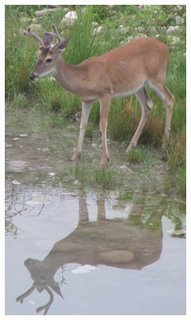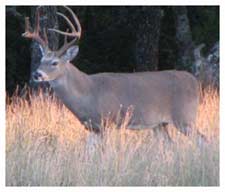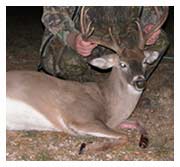Hunting Tips, Questions, Stories & Discussion
Focusing on managing Texas wildlife habitat and natural resources for native and exotic wild game species, for this and future generation of hunters and outdoor enthusiasts.Thursday, August 6, 2009
Morning Report - July 31, 2009
 Well, it rained yesterday and was 67 degress at 2pm!!!! This morning it was still and foggy, the animals were out eating the green shoots that sprang up from the rain. We had a turkey convention below the house along the river. A large group of mothers and babies were being harassed by a group of teenage jakes. Whitetail, axis, and sika were seen, two fallow bucks were below the house. Well time to get to work on the roads!
Well, it rained yesterday and was 67 degress at 2pm!!!! This morning it was still and foggy, the animals were out eating the green shoots that sprang up from the rain. We had a turkey convention below the house along the river. A large group of mothers and babies were being harassed by a group of teenage jakes. Whitetail, axis, and sika were seen, two fallow bucks were below the house. Well time to get to work on the roads!Labels: axis deer hunting, escondido hunting ranch, south texas hunting ranch, texas whitetail deer
Friday, December 19, 2008
Can you determine the age of a Texas whitetail deer by the number of tines on the antlers?
 While this is sometimes given as a method of determining the age of a whitetail buck in reality it is simply not accurate or a true method of aging a buck. It is more likely that Texas whitetail deer bucks either have four or five tines on each antler once they reach maturity, not that they continue to get more as they age. Some researchers have indicated that the diameter of the beam or central part of the antler may be used for estimating age with the thicker the beam the older the buck. Other researches are less convinced that this is accurate since antlers are grown each year and poor grazing conditions or exceptionally good years can increase or decrease the diameter of the beam regardless of the age.
While this is sometimes given as a method of determining the age of a whitetail buck in reality it is simply not accurate or a true method of aging a buck. It is more likely that Texas whitetail deer bucks either have four or five tines on each antler once they reach maturity, not that they continue to get more as they age. Some researchers have indicated that the diameter of the beam or central part of the antler may be used for estimating age with the thicker the beam the older the buck. Other researches are less convinced that this is accurate since antlers are grown each year and poor grazing conditions or exceptionally good years can increase or decrease the diameter of the beam regardless of the age.It is possible to tell the age by the teeth. Milk incisors will be shed sometime before 18 months and the teeth will have sharp ridges that have not yet been worn down from use. At approximately 2 years of age the molars are completely in and the full adult set of teeth is visible. By 5 years of age the teeth are starting to significantly wear and the grinding surfaces continue to wear with use.
Labels: texas hunting ranches, texas whitetail deer, trophy antlers, trophy whitetail buck
Thursday, December 11, 2008
Where is the best place to find Texas whitetail deer at different times of the day?
 The Texas whitetail deer changes locations according to the time of day. In the early morning and dusk hours you can find them along the edge of brushy areas, even into the middle of pastures, meadows and open spaces. They will be actively grazing on grasses and browse at these times. Typically Texas whitetail deer like to be relatively close to pine, hardwood or brushy areas to be able to quickly take cover. In the afternoon hours and the bright daylight they are found in deeper wooded areas in well sheltered and protected locations. During this time they are resting, ready to feed again at sunset. They will often feed well into nightfall, then again retreat to their bedding areas to rest and digest the food.
The Texas whitetail deer changes locations according to the time of day. In the early morning and dusk hours you can find them along the edge of brushy areas, even into the middle of pastures, meadows and open spaces. They will be actively grazing on grasses and browse at these times. Typically Texas whitetail deer like to be relatively close to pine, hardwood or brushy areas to be able to quickly take cover. In the afternoon hours and the bright daylight they are found in deeper wooded areas in well sheltered and protected locations. During this time they are resting, ready to feed again at sunset. They will often feed well into nightfall, then again retreat to their bedding areas to rest and digest the food.Most Texas whitetail deer don’t travel too far from their home range area unless there is a shortage of food. Since managed locations such as Escondido Ranch carefully control the population of the deer and other species there is little need for the animals to travel during daylight hours.
When is the breeding season for Texas whitetail deer?
The rut always begins in the mid to late fall and produces the most activity within both bucks and does. The general timeframe for the rut at Escondido Ranch is November through to the first half of December. The fawns are born approximately 7 months later with twins being common within the whitetail herd. The doe will carefully hide her young for 10 days or so, during which time she will return frequently throughout the day and night to nurse. Once the fawn or fawns are strong enough to get away from predators and the move about with ease they will follow her out onto the flatter open areas and begin showing an interest in grazing themselves.
The females will come into season around the two year mark although with excellent grazing and environmental conditions they may successfully be bred earlier.
The females will come into season around the two year mark although with excellent grazing and environmental conditions they may successfully be bred earlier.
Labels: texas deer hunting, texas whitetail deer, whitetail deer hunt, whitetail deer hunts
Archives
December 2008 January 2009 February 2009 April 2009 May 2009 June 2009 July 2009 August 2009 September 2009 November 2009 December 2009 January 2010 February 2010 March 2010 April 2010
Subscribe to Posts [Atom]
